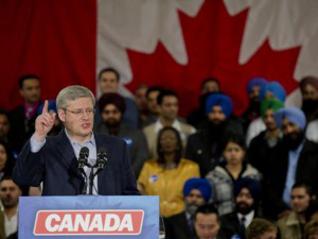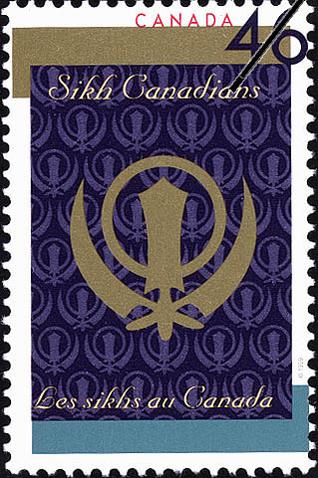Current Events
Can Sikh Americans Replicate The Sikh Canadian Success Story?
by RUPINDER MOHAN SINGH
Our neighbors to the north, Canada, just went through a federal election in which a conservative government - one that had just lost a no-confidence motion that gave rise to this election - ended up strengthening their power for the next four years. It was an odd twist of events.
A noteworthy character of this election was the wooing of the ethnic minority vote - and especially of the Sikh-Canadian vote - by all parties across the political spectrum.
The influence of Sikhs in Canadian politics is not new.
Canada first elected Sikh-Canadian Members of Parliament in 1993 (Herb Dhaliwal and Gurbax Singh Malhi - the first to also wear a turban in the Canadian Parliament), and since then, the impact of the Sikh-Canadian vote and their participation in national politics saw an increasing trend.
In this year's election, it was an impressive display of the flex of Sikh-Canadian muscle in Canadian politics as the courting of the Sikh-Canadians by politicians across Canada gained national attention. The blogger Maple Leaf Sikh discusses the results (and fallout) of the Sikh-Canadian vote in that election on his blog.
In several constituencies, most of the candidates were Sikhs themselves. Engaging and engagement of the Sikh-Canadians was so important in Canada that even the right-wing Conservative Party - the eventual victor which was historically never popular among Sikh-Canadians - actively sought Sikh-Canadian support and fielded Sikh-Canadian candidates.
With such a national influence in Canada, could Sikh-Americans achieve such prominence in the United States?
There are several examples of the Republican Party actively soliciting ethnic diversity within its ranks, and often in spite of itself. An interesting article in The Week discusses what the Republican Party in the United States could learn from its Canadian ideological counterpart - the Conservative Party of Canada - with respect to courting the ethnic vote.
However, there is a stark difference in the ethnic constituency between the two countries:
"The Canadian success owes a great deal to the specific situations of Canadian immigrant communities - situations very different from those prevailing among U.S. immigrant communities. Here were groups that were better educated than the Canadian average, more affluent than the Canadian average, more likely to own their own business, more likely to live in two-parent families - but who voted for the parties of the liberal Left because they did not feel culturally comfortable with the party of the Right. That's a problem that can be fixed by communication and outreach.
"But the largest American immigrant communities are less educated, less affluent, less likely to own a business, and less likely to live in two-parent parent households than the American average. They vote for the party of the Left not only for cultural reasons, but also because they need and want more government assistance. The Republican problem with immigrant voters is bigger and more intractable than the Canadian Conservative problem."
Sikh-Americans can't be so easily categorized under the description given to "the largest American immigrant communities". In terms of garnering a higher percentage of the vote, politicians in America would not likely get a lot of bang for their buck in collecting the Sikh-American vote as they do in Canada. Accordingly, while taking inspiration from our brothers and sisters to the north, Sikh-Americans - who would perhaps fall in the smaller group of higher education and income levels among minorities in the United States - may have to blaze our own trail to national prominence in this country.
[Courtesy: American Turban]
May 20, 2011
Conversation about this article
1: Surjit Kaur (Vancouver, British Columbia, Canada), May 20, 2011, 10:25 AM.
The only thing is Sikh-Canadians have yet to learn how to wield this power effectively and get positive results where the rubber hits the road. But, we're getting there ... slowly but surely!
2: Karam Singh (United Kingdom), May 20, 2011, 10:32 AM.
Not only can Sikh-Americans do it, they can do a far better job. On the average, they have better education, more resources, etc. If only they'd learn to focus and not allow themselves to get diverted or ghettoed into labels like 'Indian' or 'South-Asian' or 'Asian'!
3: Jesroshan Singh (Malaysia), May 20, 2011, 11:40 AM.
I was talking to my Canadian business teacher in college the other day and since we were both alone in the class, our conversation drifted to politics and the May 2nd Election which I followed on sikhchic.com. I was doing a business project on India and we were talking about Sikh Diaspora politics. She assured me that the Sikhs have always been a dynamic community in Canada. In fact a Canadian can relate more to a turbaned Sikh than Americans would because of the whole Osama thing. She also told me that the Sikhs have sealed their fate in Canadian politics as they are now major players and are here to stay. I wish my brothers and sisters good luck in their pursuit of chardi kala in that part of the world. Makes me happy and proud to be Sikh.
4: Gurjender Singh (Maryland, U.S.A.), May 20, 2011, 12:48 PM.
Unless and until Sikh-American leadership comes together to educate Americans about Sikhs and turban, it will be an uphill battle. All Sikh associations are doing a wonderful job at the local or individual level, but there is no combined effort to educate the media or Americans. Sikh-Americans have all the resources. Now, all they need is a united strategy.
5: Sandeep Singh Brar (Canada), May 20, 2011, 2:17 PM.
It's going to be tough but not impossible. Look at the odds that Obama overcame and the constant battles that he has to fight every day in order to be accepted as an American. One country encourages diversity and a mosaic of cultures and religions while the other country encourages assimilation and expects a mono-culture and mono-religion. Hence the Bobby Jindals and Haley Randhawas of the world willing to sell their souls, religions and cultural backgrounds to get a vote.
6: Irvinder Singh Babra (Brampton, Ontario, Canada), May 20, 2011, 3:52 PM.
It's the renowned Sikh-American who showed the way to politics for many. Remember Dalip Singh Saund from Chajjalwadi, near Amritsar, Punjab, becoming the first and foremost pioneer Sikh-American politician in the House of Representative in the Kennedy era; all other Sikh/ Indian politicians came after him, in the USA and Canada. So cheers to Bal Gosal, Tim Uppal and all the others.
7: Jayden Singh Johal (Vancouver, British Columbia), May 20, 2011, 7:29 PM.
I wish I could give the answer as 'yes'. However, I don't think it can happen for the simple fact that as I always tell my American friends cousins/ relatives ... In Canada people might not know who Muslims are, but they know who Sikhs are. In the States people don't know who Sikhs are but they know who Muslims are and it is very sad that Americans will always confuse the two. Sikh-Americans on average might have higher education than Sikh-Canadians but nobody knows who Sikhs are in America on average. How can we achieve success when the vast majority confuse us for Arabs, Muslims, Osama followers? Americans are the most intelligent and most ignorant people out there. The question that should be asked: is there any possibility for the 'majority' of Americans to really know what Sikhs and Sikhism are? I don't wear the articles of faith but I have relatives in the States who do and just going about the normal day-to-day things out in the public with them makes you open your eyes and realize how ignorant the majority of Americans are towards anybody in a turban and beard. My comments were not meant to hurt anybody's feelings but we need to be honest about what is going on in America and I am just glad people who are wearing the articles of the faith can do so in Canada without fear. Far too many Sikh-Americans who wear turbans seem to leave their turbans at home and try to put all their hair under a ball cap so they don't have to face the backlash of being associated with Muslims/ Osama.
8: Harinder (Delhi, India), May 21, 2011, 3:01 AM.
It is possible to overcome the prejudice, but it will need effort and hard work.
9: Gurjender Singh (Maryland, U.S.A.), May 21, 2011, 9:25 AM.
I agree with some of the finding of Jayden Singh. I have seen some Sikhs only wear aturban in the gurdwara. A few months ago, I had an interview for job promotion where I was not selected. After a few days I asked the interviewer to provide me feed-back on how I did. During the discussion, I discovered that an American born in Washington DC metro area and living there for 40 years in the Washington area did not know anything about Sikhs or the turban. He had assumed that I was Muslim. By having Nagar Kirtan in big cities like New York and Washington D.C., California and speaking in Punjabi on speakers, does not serve any purpose of teaching fellow-Americans. More carefully thought-out strategies are needed.
10: S.Dhillon (Vancouver, British Columbia, Canada), May 24, 2011, 2:30 AM.
In Canada, it was helpful that there is a large concentration of Sikh-Canadians in a number of ridings across the country, which made it easier to field Sikh-Canadian candidates. In some cases, all parties were represented by Sikh-Canadians.
11: Bibek Singh (Jersey City, U.S.A.), May 25, 2011, 8:38 PM.
Ravi Singh Bhalla will be contesting for Assembly elections this year as an 'independent' Democrat. Please visit 'http://bhallaforassembly.com/' for details. I read one of his articles that mentioned - "Often in the course of my career as a lawyer and a public servant, it has been suggested and often stated outright that I simply cannot achieve my dreams and aspirations as a Sikh. Put another way, questions have always been raised about whether there is an inherent conflict between my religion and my ability to succeed in America. I submit this article to tell you that I am living proof that the answer to this question, 'whether you need to compromise your belief in Sikhi to be successful in America', is a resounding NO. To the contrary, being a Sikh is an asset, not a liability, to professional success in the United States."






